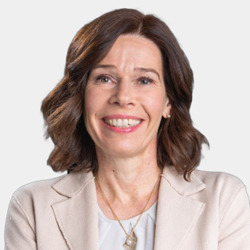
Susan Wegner
Head of Global Data and AI
Allianz

Dr.-Ing. Susan Wegner is Vice President of Artificial Intelligence & Data Analytics at Lufthansa Industry Solutions. Susan has over 15 years of experience in the fields of machine learning, artificial intelligence, and platform/software design. Susan holds a Doctorate (PhD) in Informatics from the Berlin Institute of Technology (Technische Universität Berlin).
Learn more about leaders in the DACH CDAO community here.
Give us a brief overview of the path that led to your current role.
As a computer scientist and mathematician, I started my career in the technology sector quite early and programmed artificial intelligence algorithms during my PhD.
I took my first leadership role at Deutsche Telekom Innovation Laboratories, where I built a group-wide big data competence team. The goal was to establish data as the basis for digitalisation in the company. With this goal in mind, I founded a start-up called Motionlogic as a subsidiary of Deutsche Telekom.
These activities resulted in a broader range of responsibilities as a VP with both technical and customer-centric teams. Since the topic of data and AI was taken up by more and more business units in the company, I suggested the establishment of a Chief Data Officer and initiated my next role as Deutsche Telekom Chief Data Officer. My current position as VP of Artificial Intelligence & Data Analytics offered me the opportunity to set up and shape a newly founded business unit, with a wide variety of data and AI projects with a very knowledgeable team.
What is one of your guiding leadership principles?
Positive thinking, flexible, innovative goals and team-oriented implementation. It is important for me to inspire and support my team as a coach and mentor. My goal is to develop transparent and comprehensible data and AI solutions that are easy and quick to apply, even for non-experts.
With disruption being a key theme of the past few years, where do you see your role as a CDAO going in the next 1-2 years?
For me, the development of computer vision applications is incredible. During my PHD, I worked on medical image segmentation. It took the neural network an entire night for the segmentation of a 10x10 image and the result was not very good at all. Today, we just take a photo with our mobile phone and within less than a minute, we get the most matching image from the internet. In the next 1-2 years, the focus for the CDAO will be on data governance, data management, cultural change, and reusability of solutions.
What advice would you give to someone just starting out in the role as a CDAO?
Keep a very close relationship with the business. It’s best to have a common priority roadmap. Additionally, for every implemented solution, try to get the business impact in cooperation with the business units. This way, you are able to sum up the business impact you bring with your team for the company. This experience is very essential for a central company role.
Tell us 3 fun facts about yourself.
- I love sports.
- I love positive thinking.
- I love to work with diverse teams.
What is the value of participating in a professional community through Evanta?
I am convinced that exchange fosters innovation. Thus, communities like Evanta provide huge potential to connect people and industries – especially those parties who are not directly associated with each other. It’s only with the exchange of these fundamentally different parties that innovation gains pace. Take, for example, manufacturing and the transformation it experienced with the introduction of the Internet of Things (IoT). Combining diverse industries can lead to serious advantages and support us to excel in solving our time’s challenges.
Evanta Governing Body members share their insights and leadership perspectives to shape the agendas and topics that address the top priorities impacting business leaders today.
by CDAOs, for CDAOs
Join the conversation with peers in your local CDAO community.